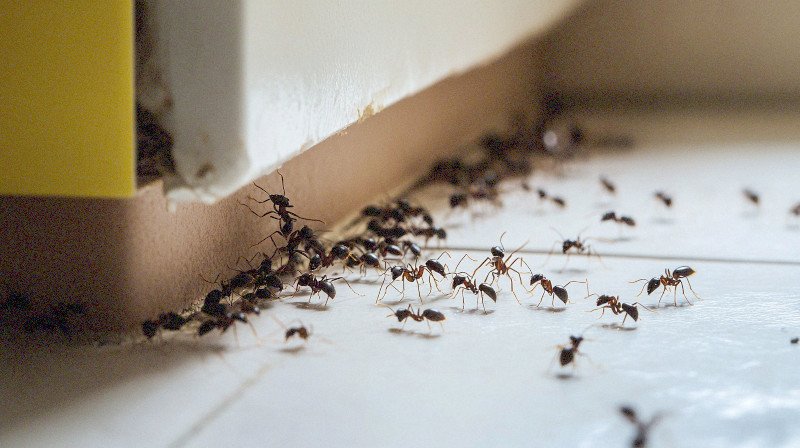Trying to keep ants out without harming them? You’re not alone.
I’m sharing tested, natural, and humane strategies to get rid of ants naturally without killing them, all verified by modern pest control science to maintain harmony with nature.
Key Takeaways
- Understand why ants invade — food crumbs, water, and shelter attract ants indoors.
- Seal entry points and remove moisture to cut off their incentives to stay inside.
- Use science-backed natural repellents like peppermint oil and vinegar to disrupt ant trails.
- Guide ants outdoors safely with humane methods instead of killing them.
- Consistency is key — clean regularly and maintain barriers to keep ants away for good.
Table of Contents
- Key Takeaways
- Why Do Ants Invade Homes?
- How To Identify Ant Entry Points?
- What Natural Ingredients Repel Ants?
- How To Block Ant Trails Without Killing Them
- How To Remove Ant Attractants Naturally
- How To Redirect Ants Outdoors Safely
- Science-Backed Prevention: Sealing & Drying
- FAQs About Getting Rid Of Ants Naturally
- Final Tips For Keeping Ants Away Humanely
Why Do Ants Invade Homes?
Ants typically invade homes in search of food, water, or shelter. If your kitchen or bathroom offers crumbs, spills, or moisture, ants find that irresistible.
Knowing why they come helps you remove what attracts them.
How To Identify Ant Entry Points?
To keep ants out naturally, first locate where they’re sneaking in. Check cracks, windows, doors, and even small wall gaps.
Once you find these spots, you’ll know exactly where to act.

What Natural Ingredients Repel Ants?
Several safe ingredients can help repel ants without harming them.
Essential oils like peppermint and vinegar disrupt their scent trails and navigation instincts.
How To Use Vinegar To Deter Ants
Mix equal parts white vinegar and water in a spray bottle. Wipe down countertops, floors, and any surfaces where you’ve spotted ants.
The vinegar breaks their chemical trail — sending them elsewhere instead of deeper into your home.
Using Peppermint Oil As A Natural Repellent
Research from IFAS Entomology confirms peppermint oil’s strong scent confuses ants’ communication.
I personally spray diluted peppermint oil (10 drops per cup of water) around baseboards and entry points. It smells great to us — but ants hate it!
Which Herbs And Plants Discourage Ants?
Some plants naturally repel ants.
Mint, lavender, and rosemary placed near windows or doors help deter them.
Want more indoor plant ideas? Check out our guide to the easiest herbs to grow indoors — many double as pest deterrents too.
How To Block Ant Trails Without Killing Them
Block ant trails by wiping them away with natural cleaners like vinegar.
Then, create barriers using cinnamon or citrus peels — these confuse ants and redirect their paths without harm.
How To Remove Ant Attractants Naturally
Keep your home spotless. Wipe spills immediately, store food in airtight containers, and take out the trash daily.
This breaks the reward system that keeps ants coming back.
How To Redirect Ants Outdoors Safely
Once entry points are sealed, gently guide ants outside using a piece of cardboard.
Some people even place sweet bait near exits — the ants naturally migrate outdoors for easier pickings.
Science-Backed Prevention: Sealing & Drying
According to University of Nebraska-Lincoln, sealing cracks and removing indoor moisture are key.
Fix leaky pipes and seal tiny gaps to cut off the invitation for ants to stay inside.
FAQs About Getting Rid Of Ants Naturally
Do Natural Repellents Work For All Ant Species?
Not always. Some species adapt quickly, but peppermint oil and vinegar work for most common household ants.
Can I Use These Methods In The Garden?
Yes — peppermint oil spray and vinegar can be used outdoors too. Just avoid over-spraying vinegar near plants you don’t want harmed.
How Long Does It Take To Deter Ants Humanely?
With consistent application, you should see fewer ants in a few days to a week. Persistence is key — keep sealing, wiping, and refreshing your natural barriers.
Final Tips For Keeping Ants Away Humanely
Combining multiple methods works best. I like to pair peppermint oil with regular cleaning and sealing entry points.
For more natural pest tricks, explore our guide to plants that deter mosquitoes and flies. You might also like our best natural bug repellents article — it’s packed with ideas to keep your home pest-free the natural way.
I'm George Brown, a passionate gardener and the founder of UrbanLeafy.com. I love helping beginners grow fresh herbs, plants and greenery, whether on a windowsill, in a garden or a tiny balcony. My practical, no-fluff tips have been featured in Homes & Gardens, Livingetc, and Best Life, and are rooted in years of real experience. If you're ready to turn your space into a thriving herb haven, you’re in the right place.



